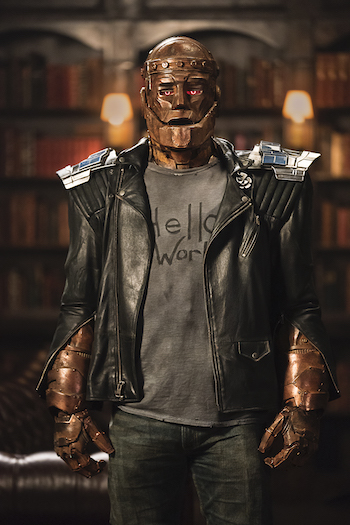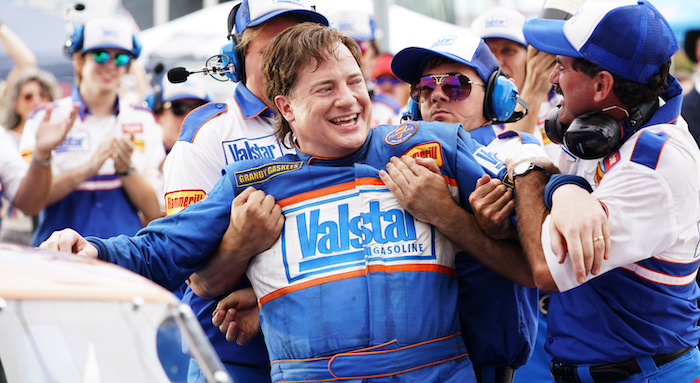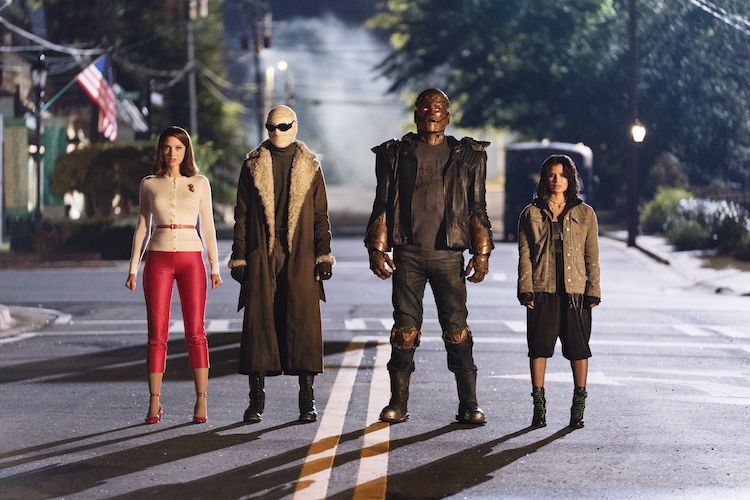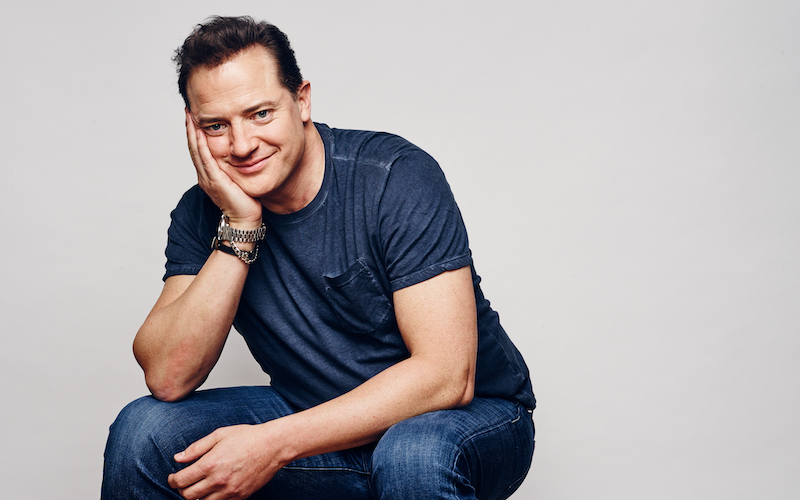“These aren’t superheroes. I hate to disappoint you … They’re just trying to get through the world which is very, very weird in their universe. They’d love to get a text message or something from Batman, if he even deigned to pay attention to them.” – Brendan Fraser
That is the gist of Brendan Fraser’s latest project, Doom Patrol, in which he portrays Cliff Steele, a.k.a. Robotman. While people may recognize him as a gem of the ‘90s and early ‘00s, with his breakout role in 1992’s Encino Man, Fraser has had a recent resurgence in a number of dramatic television shows such as Trust, Condor, and The Affair.
Even with such a diverse career, Doom Patrol is Fraser’s first venture into the superhero genre. Although, he is quite adamant that the members of the Doom Patrol are in no way superheroes, making the point that, “This isn’t the Justice League.” Only minutes into the first episode, most viewers would agree that this is a very different “superhero” tale. We had the opportunity to discuss with Fraser the complexities of his character, the challenges of voicing an expressionless robot, and what truly sets Doom Patrol apart within the superhero genre.
Innovation & Tech Today: What drew you to Doom Patrol and Cliff Steele as a character?
Brendan Fraser: Everyone in this mismatched, misfit family that they are, they’re not so much a team. Anything bad that could have happened to them already did before we meet them. Of course, subsequently, we learn what happened.
They’re not heroes, they’re not crime fighters, they’re not squeaky clean. This isn’t the Justice League. They’re actually quite anti-hero. They disdain heroism, but not as much as they secretly care for one another.
I like the idea of the journey of a man who has lived a risky, daredevil, racecar, high-octane life making dubious choices along the way. He finds, for his misdeeds, hubris and fake ketchup when he puts his car off the road with his family in it and is reincarnated – well, most of him, that is – in the body of a curious tin man of sorts that scientist and father-figure Dr. Niles Caulder gives him, as he says, “The gentle place to land,” and really a second chance.
The voyage Cliff takes is to see if he succeeds in becoming a better human being as a robot than he was as a human in a mechanical device, like his car. So we’ll see how he does along the way, but it’s a pretty fantastic voyage he takes. I can attest to that.
Related: Kevin Smith Breaks Down His Diverse Career, From Podcasting to Crowd-Funded TV Shows

I&T Today: Riley Shanahan portrays Robotman on the screen, while you provide the voice. Did you find yourself collaborating with him directly?
Brendan Fraser: We had open, fraught conversation about this. “How are we going to do this?” What it came down to was really trusting that performances are always going to win out over a CGI treatment for the characters. How are we going to portray this? Beyond a mandibular shape in the steam shovel jaw that the character has and some blinking red eyes that he can swivel left and right on the occipital bone hinge, there’s little to work with.
That’s a good thing. That means we have to be better as an actor in the suit, we have to be better as a voice performer to lay that in. So yes, I agree with you. There is a collaboration that needed to take place between myself and Riley, for sure….
I’m not trying to be vague here, but what I can tell you is that we did have to pay attention to one another. And overall, we just had to trust that the writing is strong enough that, when everything is said and done, and overthinking and hand-wringing and pearl-clutching is done, the final result is a performance that Riley gives that presses right through the mask and right through the viewer’s screen – or whatever conveyance we’re using these days – to just get the organic and visceral performance right across.
I&T Today: Because of Robotman’s lack of facial expression, a lot of his emotion has to come from his voice and your voice work. Could you talk about the extra challenge that provided?
Brendan Fraser: I can go even further than that. This is going to get really theoretical-sounding and nerdy, from leftover college days’ lore. We studied Lecoq theory; Jacques Lecoq was a French instructor and he taught a school of acting that was known as “neutral mask.” That essentially took the actor’s face away from them. It was as simple as putting papier maché masks on actors with flat expressions.
So it takes away the reliance that actors have on their faces to get the point across. It demands that they use what you would want to see apart from just looking at someone making expressions or even mugging, and see how they breathe, see how they move, where are they centered, what are the kinetics of their body, how do they relate to gravity, a zillion and one things. I know this is all very goatee, beard-scratching, theoretical actor talk, but it comes in handy and it’s a wonderful coincidence that both Riley and I have the same training. Physical comedy and combat, dancing essentially is what it is, and giving a broad, but specific, performance is really what’s needed to tell the story of how this character thinks and works.
We’ve taken away those expressions and, like I said earlier, my job is to match pitch with the physical choices that the actor is making. Or, even add to them.
It’s a process that takes a team. I’m standing on the shoulders of giants. I’m not on an island in playing this character, believe me. You’re kidding yourself if you say that. I’d be fraudulent to say that, “Yeah, this is all my doing.” No, no, no. This takes many, many people.

I&T Today: The amount of superhero media is so abundant. What does Doom Patrol bring to the genre that’s different?
Brendan Fraser: There are similarities in most everything. Let’s not forget, depending on who you’re talking to, that X-Men was conceived of maybe a little after Doom Patrol came to print…
I don’t think there’s any impropriety because a good idea is a good idea is a good idea. How does it differ? I don’t know if it has since those early days apart from Doom Patrol have always maintained that they are quite vigorously anti-hero and they’re not squeaky clean. They’re not fighting villains, they’re not out to right the wrongs of the world. They have more psychologically-based foes. The villains in the world around them attack, really probe, the dark psyche of who they are and what they do. And that’s the appeal.
It does stand apart, not to say that it’s the only one, the only entity that’s taken that approach in comic book lore, but it does not deviate from that original model. That’s a tall order.
But what I’m telling you is that it has remained faithful to the really broad and unrelenting choices that this seemingly innocent comic book story has taken and made best efforts to bring it to the screen. Its popularity may not have been … I was not aware of it. Many, many people weren’t. But that’s just a testament that it’s new, and we could cheapskate and do whatever we wanted to, but we haven’t. We’ve stayed true to what the source material was in more than one way, which is not just to keep the storylines complete, but to also represent the comic book world through the use of all the technology available in CGI and all the visual imagery that we have available now on a level that succeeds in upstanding that comic book sensibility and world.

I&T Today: Looking at your whole career, you’ve played such a diverse array of characters. Is there something specific that makes Cliff Steele stand out to you?
Brendan Fraser: Cliff Steele stands out to me because, as I said before, he’s done some questionable things. He’s lived a borderline amoral life, but he lives with huge regrets at the same time. And he gets
a second chance at it, but in a real handcuffed way. Namely, he could have done a lot better as a flesh and blood, breathing man, but now his intellect is plopped into this bucket of bolts and he has to figure out how to be a better version of that.
I’m still learning the character as we go along, to be honest. I don’t know if I know definitively how to say who Cliff is, aside from … he’s the everyman who is astonished by what’s around him, but his voyage is to reconcile his past.
I&T Today: Now that you’ve gotten a taste for the superhero genre, do you have another comic book character you’d want to portray?
Brendan Fraser: I know there are many of them that I’ve loved watching being brought to screen over the years. Some better than others. I’m pretty happy with the job I have right now. That’s a tall enough order and I don’t know if I’ll be shedding Robotman or Cliff Steele anytime soon in the eyes of the learned comic book fans. I think you get maybe one bite at the apple, but I’m happy with how shiny and crispy and tasty my apple is.











